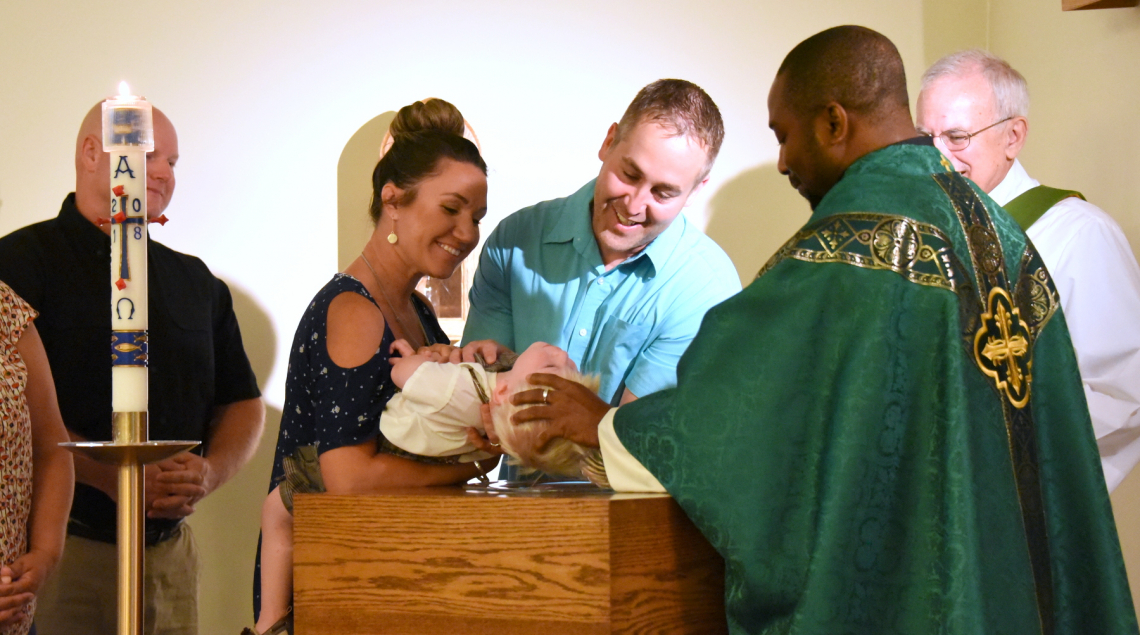The Sacraments - Baptism

The Sacrament of Baptism
The Catechism of the Catholic Church tells us that “Baptism is the basis of the whole Christian life, the gateway to life in the Spirit, and the door which gives access to the other sacraments” (CCC 1213). Through baptism, we are freed from sin and reborn as children of God. Through baptism, we are incorporated into the Church and become sharers in its mission. No matter what age the person might be, baptism is that person’s spiritual birth. The words of Christ, other Scripture passages, and the consistent teaching of the Church affirm that baptism is necessary for salvation. Thus, the catechism affirms: “the Church does not know of any means other than Baptism that assures entry into eternal beatitude” (CCC 1257). (More on this question at the end of this article.)
Baptism is celebrated by immersion in water or the pouring of water onto the candidate’s head. The meaning and grace of baptism are present either way but are more clearly seen in immersion. The immersion in water followed by the rising from the water represent the Passion, death, and resurrection of Christ. The baptized person becomes one, sacramentally, with Christ in His Paschal Mystery and thus can now receive its effects.
Water has always been used to cleanse. Thus, the baptized person is cleansed from sin. In the case of older children and adults, their sins are forgiven in baptism. In the case of all the baptized, the power of original sin is broken as well. Every human being born into this world is damaged by the presence of sin in the world, just as a baby born of a mother who is a drug addict will be born damaged by the drug abuse of the mother. Every human being needs the grace of baptism.
Water is also a necessary element for life. Baptism not only forgives sin and breaks evil’s power, but it also brings about regeneration and renewal. The baptized person begins to share in the very life of God.
Light is also an important symbol of the grace of baptism. The baptized person is enlightened by Christ. This person is now to walk in the way of Christ, given to us through the teachings of the Church, and not in whatever direction the winds of popular culture happen to be blowing. Catechesis is the way this light is nurtured. In the case of baptized adults, this catechesis began before baptism. In the case of infants and young children, catechesis is entrusted to the parents to take place after baptism. For the parents of an infant, baptism is not merely a ritual to be done at a certain age that they can then check off and put aside once it is done. Baptism for the parents means that they are committing themselves to doing all they can to nurture the new life of faith their child has received. The Church does not look for a perfect faith from the parents, no more than from an adult who is baptized. The Church does look for a basic openness and willingness on the part of the parents to understand this commitment, assent to it, and make it their own.
Baptism may be celebrated at any time, but the most fitting time for baptism is the Easter Vigil. The Easter Vigil is the celebration of the birth of the Church and is also when all the baptized celebrate the anniversary, so to speak, of their own baptism. The vigil Mass incorporates significant elements of the baptism ceremony even if there is no one to be baptized that year. It is the ideal time for all of us to recall our own baptism and to renew our commitment to Christ and His Church.
Let us return for a moment to the question of baptism being necessary for salvation. We may ask what happens to people who lived and died unbaptized through no fault of their own. Today’s Western culture finds the very idea of one ritual from one religion being necessary for salvation to be arrogant at best. Yet it is, and remains, the teaching of Christ and the Church. In the case of people who lived and died without baptism, we commend them to the grace of God. The Lord Himself gives us the sacraments, so we aren’t free to dismiss them. Yet, the Lord’s grace is not restricted to the sacraments in every case. In the case of those who feel offended by such claims, it is not our intention to offend, but we must be faithful to what the Lord has taught us. The necessity of baptism flows from our faith in Jesus Christ as true God and true man, and it is inseparable from it.
For further reading: Catechism of the Catholic Church, nos. 1213-1284
By: Father Mark Nolette, a priest/hermit of the Diocese of Portland










